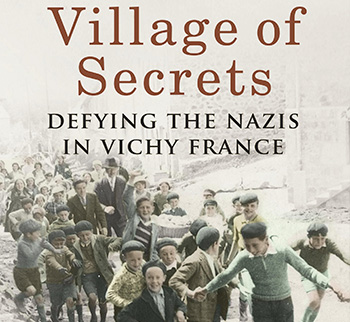Thank God, most of us born in Canada after the middle of the last century will never be tested the way the generation of our parents and grandparents were tested. During World War II, to be Jewish in most of Europe, was to be preyed upon and hunted down like a pitiable, doomed fox by a frenzied pack of braying hounds.
Fear was the European Jew’s constant companion. Bravery and courage were seldom guarantors of survival. Sometimes it was sheer, dumb luck that led the way to survival for yet another day.
And sometimes it was the extraordinary kindness and compassion of strangers, those truly selfless and brave individuals who risked their own lives and the lives of their loved ones to protect and shelter the men, women and children whom Nazi ideology had turned into human quarry.
Caroline Moorehead, an award-winning writer, has written a deeply compelling book about the astonishingly courageous behaviour of the men and women in the 22 villages, hamlets and isolated farm houses on the Plateau Vivarais-Lignon, a high mountainous region in the south-eastern part of France.
“[M]ore people, proportionately, were saved [on the plateau] than anywhere else in France. Saving was what the local people did, silently, acting together, working things out, planning, sharing the burden,” she writes
According to Moorehead, some 800 individuals were saved, “though perhaps 3,000 more may have passed through, helped along their way to safety.”
The high plateau – “remote, inaccessible and defiantly independent” – was “the ancient stronghold of persecuted Huguenots.” As a result, Moorehead writes, its residents were imbued with the notion of resistance to oppression as a theologically moral imperative. She describes this moral imperative with exquisite clarity. Indeed, the honest, no-holds-barred lucidity of her writing is one of the key elevating strengths of the work.
Moorehead insightfully depicts the political, cultural, emotional and military climate of France during the war years and provides an instructive, introductory historic context for the attitudes and behaviours of the men and women of the plateau. She undertook the considerable research and literary effort of following the destinies of some 50 individuals, whose lives and actions are instrumental in conveying the full profundity of what transpired in France during the war. And she is fearless in expressing her observations and in formulating her conclusions.
For example, Moorehead is blunt about the crimes of Vichy France. “It would be many years before it was acknowledged that, from the very beginning, with their censuses, their revisions of nationality, their Statut des Juifs, their seizure of property and businesses and their expulsions from professions and jobs, Vichy had effectively paved the way for Hitler’s Final Solution in France. By turning Jews into inferior beings, by interning them in camps, where they starved and grew sick and died, by letting loose on them anti-Semitic zealots… they had make it far easier for the Germans to do their work. The Nazis could have done little of this on their own….No other European country had taken such a clear anti-Semitic line.”
The Nazis waged two wars simultaneously: one against the armies of the Allies and the other, against the Jews of Europe. We sometimes block our minds from remembering how relentless and merciless, how cruel, sadistic and brutal was their war against any and every Jew, whether infant or child, old or infirm, man or woman. Even when the Nazis knew the war against the Allies was lost, they did not abate their efforts against the Jews. Indeed they become even more feverishly demonic in their zeal to kill and steal from the Jews.
Moorehead notes that in November 1943, “the Germans decided to take overall control and a concerted drive, meticulous and efficient, had been launched to find and deport France’s remaining Jews in a race against the clock and the arrival of the Allies, now recognized to lie not far ahead. In recent months they [the Germans] had become skilled at distinguishing forged documents from real ones. Helped by the Milice (the French militia in Vichy comprised of thugs and far-right nationalists), the Gestapo redoubled their efforts at identifying schools, convents and families in which children were held, raiding prisons, labour camps and farms for adults. Ever more generous rewards were offered to informers.” There was simply no satiating the Nazi’s craving for genocide.
Moorehead tells us: “Of the 150,000 people who had been deported from France, 75,721 of them were Jews. While a little less than half of the political deportees came home – 40,760 out of 86,827 – only 2,564 Jews did so. More than 10,000 Jewish children under 18 had been put on to trains for the death camps: 300 survived.”
She movingly recreates the suffocating, frightening atmosphere that enveloped the men and women who lived through those dark times in nearly every outing, during casual conversation in a coffee house or in a simple transaction with a stranger.
Three quarters of the 330,000 Jews who lived in France in 1940 did survive the war, Moorehead reminds us. “This was due to many things: the existence of an unoccupied zone until late in 1943, the presence in France of such a small occupying force, but it was chiefly because of the behaviour of a number of ordinary French people; and of this, the Plateau Vivarais-Lignon was a remarkable example.”
Moorehead wrote Village of Secrets to establish an accurate record of the daring goodness of the people of the Plateau and of others outside the plateau, who were involved in sheltering and saving their fellow human beings. The moral rectitude of these people sparkles with hopeful, inspiring light, which, perhaps, can shine an encouraging glow into the dark spaces of our own moral hesitation.
Village of Secrets reminds us of the possibility of achieving good despite horrific circumstances. It is an important literary achievement.
